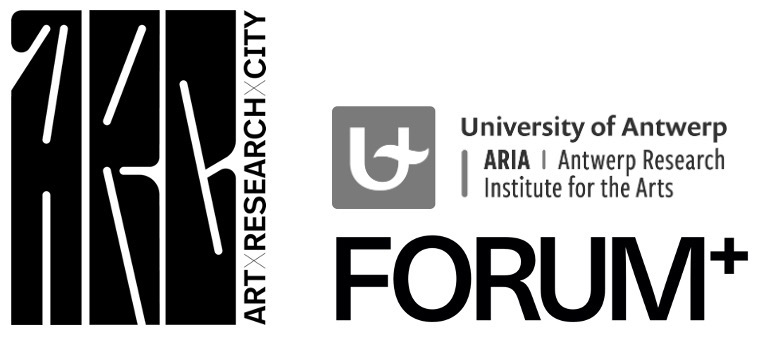Making Art + Research Public
Roundtable and networking event organised by ARIA and FORUM+
within the framework of 'Art x Research x City - ARIA's month for Research in the Arts'
Panel: MICHELLE COENEN (communication officer University of Antwerp, formerly Museum Hof van Busleyden), SARAH HENDRICKX (artist and researcher at St Lucas School of Arts Antwerp), TOON LEËN (artist and researcher at PXL-MAD School of Arts), and SANDRA SARA RAES OKLOBDZIJA (artist-researcher at RITCS – School of arts & creative producer at ROBIN vzw), introduced and moderated by NELE WYNANTS (editor in chief FORUM+, research professor ARIA).
Art, research and research in the arts require an audience.
The result of research in the arts is often an artistic work, which usually includes the process and reflection of the research. The work, the exhibition or the publication, however, are not merely a culmination, but an intrinsic part of the research process. It is a crucial step that also moves the artist-researcher forward in the research process: writing an article, experimenting in the rehearsal room or developing a dramaturgy for an exhibition require the artist-researcher to tweak their questions, refine the method used and accurately name observations - in short, to translate the experiment and headwork in function of an audience. This is not a solitary matter and usually occurs in close dialogue with peers, editors, curators, dramaturgs or communication specialists. Thus, making art public also entails making a public.
To document and communicate the research process, artist-researchers and their sparring partners make use of various media. They do not limit themselves to articles or books, the classical output channels for research. Different stages of an artistic research trajectory can also result in podcasts, documentaries or exhibitions. Sometimes this process of 'making public' requires a translation/conversion from one medium to another: a performative experiment can be documented and exhibited with a visual report or published in a magazine with accompanying text. Communication about art and artistic processes is therefore also a (re)search in itself: a challenge in finding the right medium and in conveying a clear message that does not detract from the artistic nuance. The results of research in the arts can include a multitude of forms that are often intertextually related.
In this public panel, we will collect best practices from artist-researchers and communication specialists: How can artistic research in all its diversity and variety be made public? How to best document and communicate artistic research processes and results? How do you choose the right form of communicating research results? How can (scientific) communication specialists take the specificity of research in the arts into account while offering advice?
This event will conclude with the festive launch of the new edition of FORUM+ for research and the arts, followed by a reception.
Other publishing channels for research in the arts will also be available for perusal: FORUM+, Track Report, YellowPress, VALIZ/ Antennae series, ...

(image: Risk Hazekamp - Topographic Landscape - Analogue photographic film negative dissolved by Cyanobacteria - 2021, detail)




